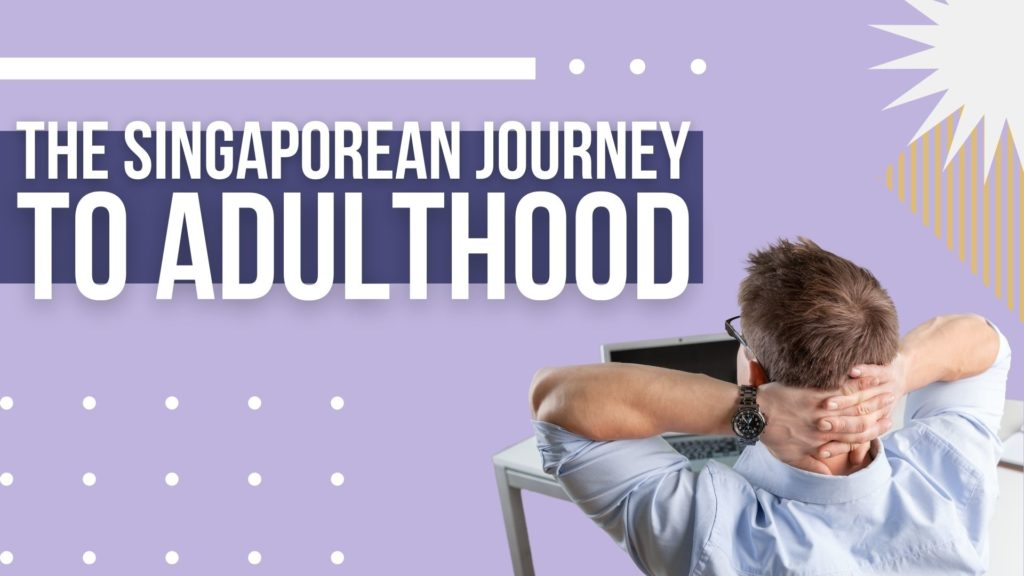Written by Credit Bureau Singapore
Have you been adulting recently?
“Adulting” is a commonly-used term to refer to the practice of behaving as though one is a responsible adult — in particular when executing mundane, but necessary everyday tasks. The life of an adult is filled with pivotal decisions and heavy responsibilities, and can often seem overwhelming, especially to those just stepping through the doors of adulthood. But newbies to the world of adulting can rest easy — we’ve put together a guide to get you through this new shift in your lifestyle, and added our tips to make this journey easier for you!
1. Finding a Full-Time Job

The first step after (or even before!) graduating is to secure a full-time job — it could come in the form of a salaried position, traineeship, or even constant freelance work to sustain the ever-growing expenses that accompany adulthood. However, in the current intense job market, this can seem like a daunting task.
Fret not! There’s a myriad of resources available for you to sift through the job options available to you. Job portals — such as JobsDB, and JobStreet, that allow you to explore jobs by industry, position, and pay range. These portals are immensely useful for your job search, as they allow you to identify positions that are best-suited for your qualifications and interest.
With that said, it is also important to be practical, and know what you, as a job applicant candidate, can offer to potential employers. If you’re interested in furthering yourself, you could consider upgrading your existing skill set with Work-Study programmes, or online courses. These will not only allow you to gain new strengths and skills, but are also attractive additions to your resume, which could increase your chances of getting your ideal job. Speaking of resumes, there are many high-quality designing tools online that could assist you in making a professional-looking resume. Graphic design platforms, such as Canva, offer a wide range of ready-made resume templates that you can use as the basis for your own.
2. Apartment Hunting

The journey to adulthood wouldn’t be complete without one major milestone in independence — living in your own home. For Singaporeans, the path to home-ownership can be expensive, and reliant on a wide variety of external factors. To apply for a Build-To-Order (BTO) flat, Singaporeans must fulfil a certain criteria, and thereafter be willing to wait minimally 5 years (in the best case scenario!) to get their own home. It’s a time-consuming process, and many Singaporean couples apply for BTO as soon as they are eligible for it.
However, for those who aren’t eligible for BTO, or to buy HDB flats at all, there exists several other living options for those craving independence. While a select few have the financial resources to invest in private property, such as condominiums, affordable options do exist for the rest of us!
Take, for example, co-living. Co-living is the practice of sharing an apartment, or living space, with other roommates. There are many co-living spaces in Singapore, and even websites that allow you to find roommates and places to rent.
Do note, however, that it comes at a pretty steep price. The average cost of a room in Singapore can range from $500-$1,500 SGD, depending on location and size. It’s a hefty cost to pay, especially if you’re just starting out in your career, so do ensure that it is within your financial capabilities to explore co-living.
3. Investing in a Savings Plan

A saving plan is like the piggy banks of our childhood — only they come with more benefits. Saving plans help you to (you guessed it!) save money, and grow interest with time. It guarantees that you are committed to saving a designated amount every month, and most adults sign up for one as a way to discipline themselves into the habit of saving.
Most saving plans come with a lock-in period to allow sufficient time for the money deposited to accumulate interest and grow into a larger amount. These plans can become incredibly useful in the future, whether you designate it as a rainy day fund, or for achieving life goals, such as buying a house.
If you are unsure about which saving plans would best suit your needs, we’d advise you to consult your insurance agent on which plan would work for you, given your current saving capacity, and financial goals.
4. Giving Back to your Parents

Even as you spread your wings, and blossom into adulthood, it’s worth remembering that your parents are aging as well. While the importance of filial piety varies from person to person, most of us have good reason to be grateful to our parents for providing and caring for us from birth. You don’t have to fund their entire lifestyle, but small contributions here and there can make a world of difference.
For those of you with retired parents, consider providing them with a small monthly allowance that comes from a fixed portion of your income. As your income increases, so will their allowance, without impacting your overall standard of living.
Another way to show appreciation to your parents is by paying for your own personal bills, as well as contributing to the household utilities. This can help to lighten the financial burden that they’re facing, and demonstrate our gratitude towards them.
One thing to bear in mind is that different bills have different repayment dates, and it’s easy to have these dates slip your mind. This could lead to unpleasant consequences, such as late penalty fees, and even an affected credit score. We suggest noting all the different billing dates on a single calendar, with scheduled reminders, or scheduling all your bill repayments for the same date.
5. Applying for Credit Cards

Credit cards have many uses — and for adults, this includes paying bills. Owning a credit card can bring about many benefits for you, including Cashback, Airmiles, Point Reward System, and Co-brand (affiliated cards).
Another major benefit of owning a credit card is establishing a credit history. A good credit history is a proof of your financial responsibility, and that in itself is a valuable asset to you. For those unaware, the way you use your credit card, and how you repay your credit card bills (be it in a timely manner … or not so much), is recorded by banks, and then reported to credit bureaus. In Singapore, credit payment history is reported to the Credit Bureau Singapore (CBS), and put in a credit report.
This credit report includes your credit score, which indicates your credit worthiness, and the probability of you defaulting on your loans. With a good credit history comes a good credit score, which is in turn invaluable when it comes to applying for credit, qualifying for loans, and even securing a job in the finance industry and government agencies.
On the other hand, those who misuse their credit cards are penalised with an unsatisfactory report, which will make it more difficult for them to accomplish all of the above. A credit card is a powerful tool that could either help or hinder you in the future, so it’s important to select a card that suits your lifestyle, and be mindful of not falling into the trap of excessive spending. Feel free to explore around the internet for a comprehensive and comparative list of credit cards available to you.
If you are interested in checking your credit score, you can purchase a copy of your credit report at https://www.creditbureau.com.sg/! You can also view a sample credit report with detailed explanation over at this handy website: https://www.creditbureau.com.sg/enhanced-consumer-credit-report.htm
We hope you are more familiarised with the upcoming phase of life and can begin making the preparations to embark on it. Adulthood comes to us at different ages and you shouldn’t compare yourself with others. Take things in your own stride and always put in your best effort☺ Also, be sure to follow and like our Facebook page @creditbureausingapore for more useful content and tips to maintain a good credit reputation!




